Home > Articles > The Archives > Joe Meadows—Mountain State Fiddler
Joe Meadows—Mountain State Fiddler
Reprinted from Bluegrass Unlimited Magazine
October 1978, Volume 13, Number 4
Numerous fiddlers have made notable contributions to bluegrass music. Joe Meadows ranks among the more prominent, particularly during the decades of the fifties and the seventies. In between Joe took a long vacation from music but during his two active periods he established himself as an influential and significant sideman. Currently, as a member of Jim and Jesse’s Virginia Boys, Joe is continuing to fulfill this role with distinction.
Born Ralph Meadows at Basin, West Virginia on December 31, 1934, Joe grew up listening to old-time string music. He spent most of his boyhood in nearby Camp Creek. Both communities were located in Mercer County. His mother picked the guitar with considerable skill and taught all of her nine sons to play that instrument. Joe’s father and both grandfathers fiddled but he never took a formal lesson from any of them. He did not actually take much interest in the fiddle until he reached the age of fourteen. He first learned on his own.
Once Joe began to study fiddle, he received much of his teaching from the radio. At nearby WHIS Bluefield such groups as the Lonesome Pine Fiddlers with Curly Ray Cline, Rex and Eleanor Parker, and Fairly Holden with Wayne Tilford on fiddle all made an impression on Joe. Somewhat farther away at WCYB Bristol, the Stanley Brothers band usually featured a fiddle. Most significant of all, the sounds of Howdy Forrester, Benny Martin, and Chubby Wise influenced Joe and his stylings.
Joe did his first professional work with a group at WGEH, Princeton, West Virginia called the Whispering Strings. This band played a type of music akin to western swing and did a lot of square dances during the six months Joe worked with them. He then moved to WHIS in Bluefield, West Virginia and fiddled with Rex and Eleanor Parker for a few months.
In August 1953, Joe teamed up with the youthful Melvin and Ray Goins. The boys had a daily radio show at WHIS and resided in the Drake Hotel. Financial success eluded the youths and they often had to cook their meager food in their hotel room on an electric hot plate contrary to house rules. Melvin humorously recalls one embarrassing incident when he tried to convince the maid that the smoke she smelled was coming from the street at a time the fumes were pouring from a dresser drawer where they were futilely concealing the hot plate.
Joe played with the Goins Brothers until November 1953 when the band fragmented. Melvin and Ray then joined the Lonesome Pine Fiddlers. Joe, on a strong recommendation from Curly Ray Cline, went to Bristol and became one of the Stanley Brothers’ Clinch Mountain Boys.
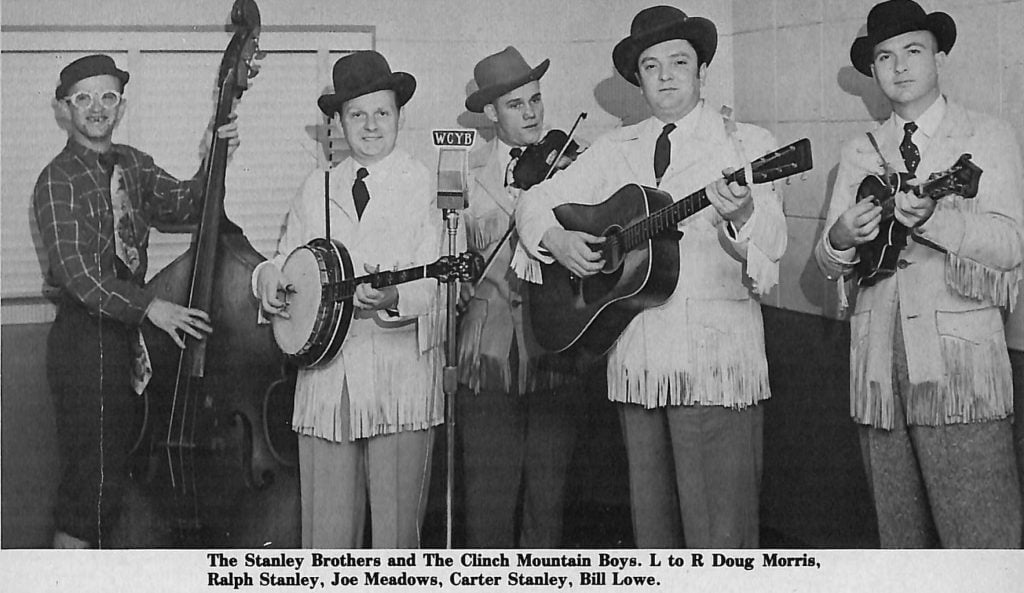
At the time Joe joined Ralph and Carter’s group, the Stanley’s had achieved wide acceptance from their daily appearances on WCYB’s Farm and Fun Time. They had also begun to record for Mercury Records. In the couple of years that Joe played with the band he participated in some of the Stanleys’ more memorable Mercury sessions. His fiddling is, of course, most prominent on such instrumental showpieces as “Hard Times” and “Orange Blossom Special.” However, it can also be heard on such classic songs as “Nobody’s Love Is Like Mine,” “Harbor of Love,” and “Baby Girl” as well as several sacred numbers. Joe also played lead guitar on a few Stanley recordings.
Joe also fiddled on the Stanleys’ very untraditional Mercury arrangement of “Blue Moon of Kentucky.” As Joe recalls the event, Bill Monroe himself visited the Stanleys when they were in Nashville to record. He played a tape of the newly recorded Elvis Presley arrangement and “encouraged” the Stanley Brothers to work out a rendition based on the new styling. This is exactly what they did with their then musicians Charlie Cline on lead guitar, Bill Lowe on mandolin and Joe on fiddle.
It was also during his Stanley years that Ralph Meadows took the name “Joe.” The Stanleys thought it somewhat confusing to have two persons named Ralph in the group. His mother had previously used Joe as an unofficial middle name anyway, although only the name Ralph appears on his birth certificate.
When Joe left the Stanley Brothers he returned to West Virginia where he and banjo picker, Billy Pack, worked briefly with the Lilly Brothers. Everett and Bea Lilly returned home from Boston for a short time and worked out of WOAY in Oak Hill, West Virginia. Then Joe received a call from Jim McReynolds in Wheeling. As a result he moved to WWVA and joined the Virginia Boys.
At the time Jim and Jesse worked at the Wheeling Jamboree, Hylo Brown also worked with the group as a sort of double act. In addition to Joe, the band also included Don McHan on banjo and Dave Sutherland on bass. George France played banjo part of the time and Chick Stripling did some comedy. After two or three months at Wheeling, the group moved to Live Oak, Florida and worked on the Suwanee River Jamboree.
Following this first stint with the Virginia Boys, Joe went to WSM’s Grand Ole Opry and Bill Monroe’s Blue Grass Boys. This was not a prosperous time for Monroe (1957) but, as always, Joe enjoyed the music. Joe Stuart played banjo at the time and Bessie Lee Mauldin bass. The band went through three lead singers, Carl Vanover, Enos Johnson, and another fellow whose name Joe has forgotten.
After six months with Bill Monroe, Joe came back to West Virginia briefly prior to joining forces with Bill and Mary Reid in Lynchburg, Virginia. This now nearly forgotten duo played a variety of country and bluegrass music and earlier recorded for Columbia. During Joe’s stay with the Melody Mountaineers, Swanson Walker played banjo and Curly Game played electric guitar in addition to Bill and Mary on guitar and bass, respectively. Somewhat later Curly Lambert rejoined on mandolin and the band did a session on Starday. For Joe, these recordings represented something of a high point in his early career because Benny Martin twin-fiddled with him on the session.
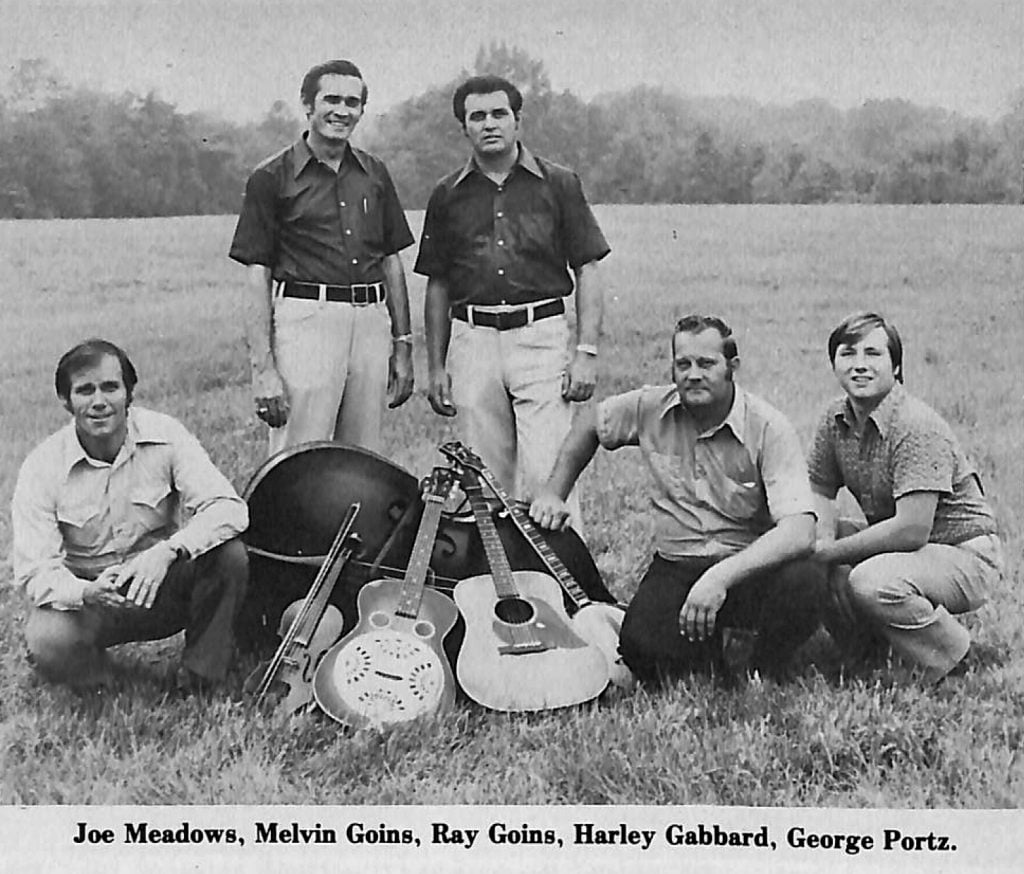
Joe next worked as a sideman at WSVA Harrisonburg, Virginia doing both radio and television work with Buddy Starcher. The latter was a straight country musician, whose career in radio extended back into the late twenties although he never made any records until 1946. Buddy’s radio career covered over much of the country but he had a particularly strong following in West Virginia and the Shenandoah Valley. During an earlier sojourn in Harrisonburg in the early forties Buddy gave Mac Wiseman some of his earliest professional work and Mac in turn had recorded two of Buddy’s songs—“I’ll Still Write Your Name in the Sand” and “Fire in My Heart”—on his early Dot sessions.
Buddy’s group at Harrisonburg included his wife Mary Ann, a onetime singing cowgirl at WLS, and Herman Yarbrough, an electric steel player. The latter also doubled in the comedy role of Roscoe Swerps, a zany character who wore bermuda shorts and a baseball cap twisted sideways. Early in 1960, the Starcher aggregation moved to WCHS-TV in Charleston, West Virginia. They soon established themselves as an especially popular group on an early morning show and added more musicians to the band. They recorded several sides on the Starday and Nashville labels, some of which featured Joe on fiddle.
After a time, Joe left Buddy and returned to the Princeton area. A couple of years later he returned for about six months and then departed again. Mary Ann Starcher recalls that Joe’s devotion to his fiddle music was about the deepest she ever saw. Joe in turn regarded the congenial Buddy as “a fine fellow to work for.” This experience in Charleston proved to be Joe’s last professional playing for about a decade, during which time he earned his living in construction work.
In 1972 Joe Meadows played on stage with the Goins Brothers at their Lake Stephens Festival. Early in 1973, Joe decided to record a fiddle album after some years of virtual retirement. This recording appeared on the Bluegrass label and also featured Buddy Griffin on banjo, George Ward on guitar, and Rob Mashburn on bass. The album included such tunes as “Candy Gal,” “Cruel Willie,” “The Shawnee,” “Katy Hill,” and “Rutland’s Reel.” This effort served as a vehicle for Joe’s active re-entry into bluegrass.
Melvin and Ray Goins then contacted Joe about helping them do their “Tribute to the Lonesome Pine Fiddlers” album on Jessup. They journeyed to Jackson, Michigan on February 2 and the next day recorded what became their finest recorded effort up to that time. Melvin also talked Jessup into doing a fiddle album featuring Joe. This album featured such tunes as “Lee Highway Blues,” “Eighth of January,” and “Black Hawk Waltz.” Harley Gabbard and Leslie Sturgill on Dobro and bass, respectively, also worked on those sessions. On the trip south, Joe decided to join the Goins Brothers as regular fiddler.
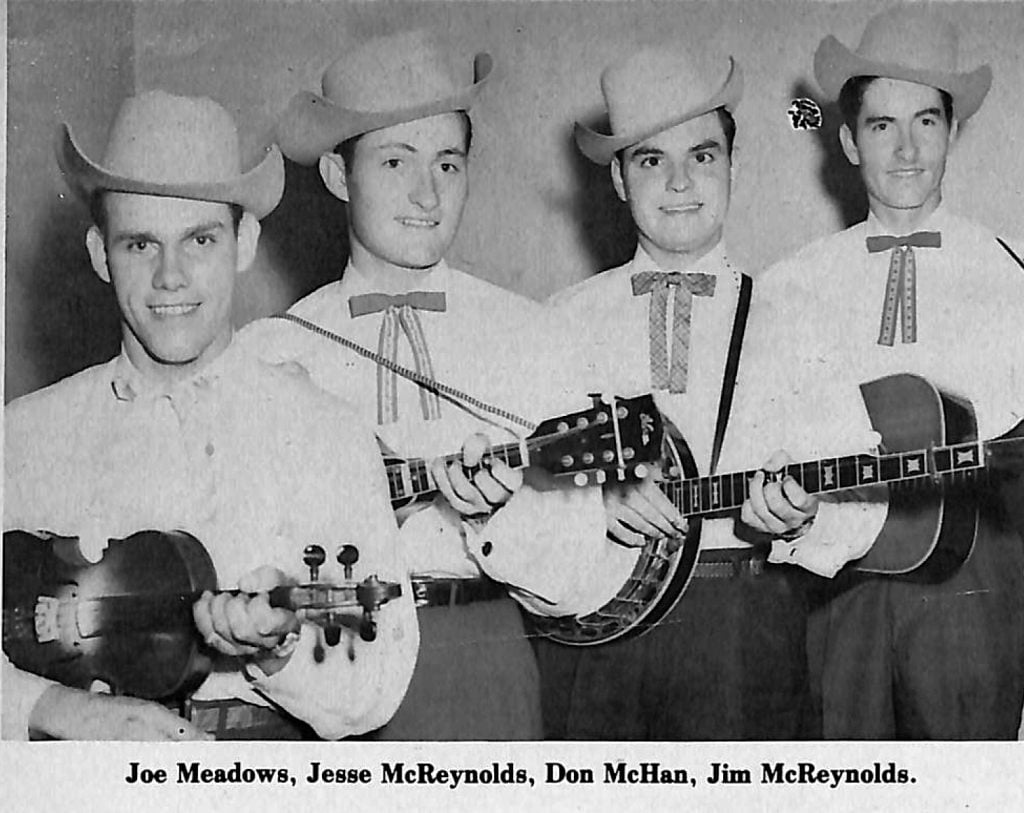
Joe Meadows soon proved that he still had all of his skills and perhaps a few new ones as well. His talented fiddle added considerably to the Goins sound throughout the festival season of 1973. It also led to Joe fiddling with a number of others of like quality on MCA’s magnificent live “Beanblossom” album that June. Joe subsequently recorded two more albums with Melvin and Ray on Jessup, their “God Bless Her, She’s My Mother” gospel effort in August and an additional album in December from which only the title song, “Bluegrass Blues,” has been released as one side of a single. A year after he left the Goins Brothers Joe returned long enough to play fiddle on the session that resulted in Melvin and Ray’s first Rebel album.
Early in 1974, Joe joined Larry Sparks and his Lonesome Ramblers including Wendy Miller on mandolin, Art Wydner on bass, Joe on fiddle and first Tim Maynard and then Dave Evans on banjo helped Larry cut his “Where the Sweet Waters Flow” and “Lonesome Sound” albums on Old Homestead, his “Footsteps of Tradition” album on King Bluegrass, and the remainder of Larry’s last Pine Tree album. Joe also cut his third fiddle album, “Portrait of a Fiddler,” on Old Homestead with the aid of Sparks, Miller, Evans, and Wydner. The album generally received favorable reviews and included several standards as well as lesser known tunes like “Oklahoma Redbird,” Curly Herdman’s “Stony Creek,” and Kenny Sidle’s “Wally’s Tune.”
Then, in June 1974, Joe rejoined Jim and Jesse’s Virginia Boys and found his most enduring job as a sideman to date. Jim and Jesse play one of the most active festival schedules in addition to their frequent Grand Ole Opry appearances. Having worked with the group in past years, Joe is well acquainted with their style and personalities. To date, Joe has worked on three albums for Jim and Jesse’s Old Dominion label, “Jesus Is the Key to the Kingdom,” “Songs of Our Country,” and “Palace of Song.” He also participated in their successful 1975 tour of Japan and the joint Towa-Old Dominion two album record set, “Live In Japan.” His most recent effort with the Virginia Boys consists of an album of banjo tunes featuring Tim Ellis, the new banjo picker with Jim and Jesse.
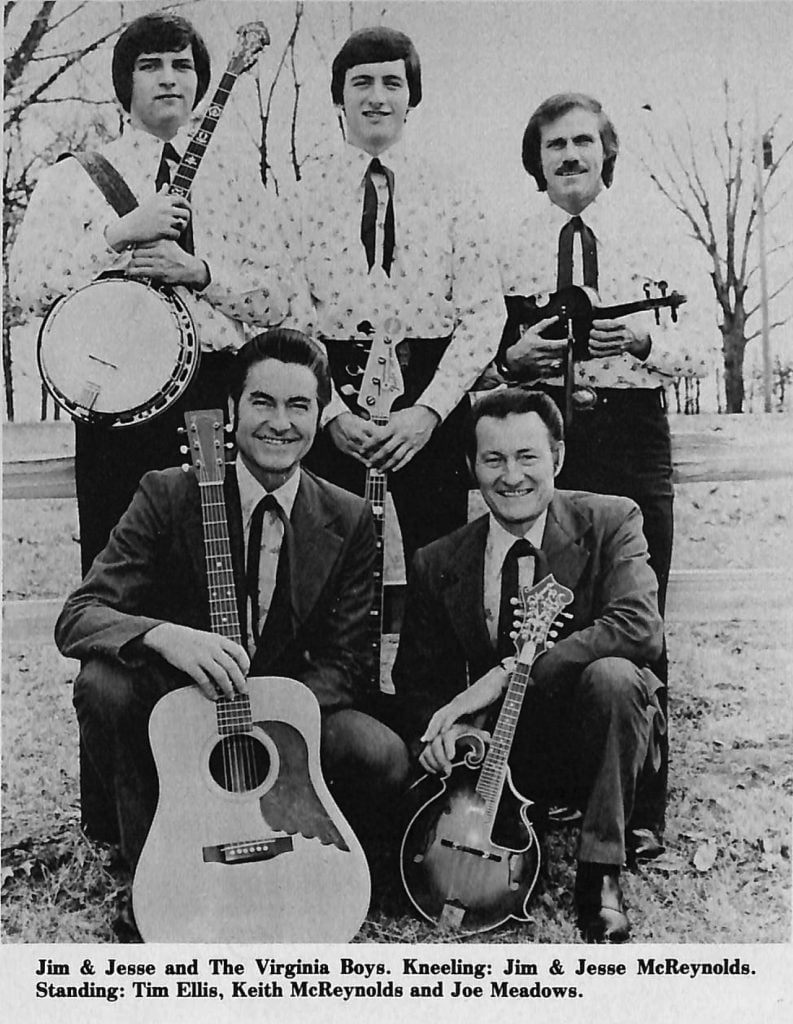
Joe has also continued to record on his own. In September 1976 he recorded a second album on Old Homestead entitled “West Virginia Fiddler” which included several lesser known and original tunes. This album featured several assisting musicians of which Mike Lilly and Wendy Miller on banjo and mandolin, respectively, were most noted. Somewhat later, Joe recorded a twin fiddle album with Buddy Griffin. The latter, another West Virginian, has earned a name as one of the better young fiddlers on the contemporary scene. Buddy acknowledges a considerable debt to Joe in his own stylings and has become known mostly for his work with the Goins Brothers and Katie Laur in addition to sessions with Mac Wiseman and others on the Vetco label. The album itself includes some lead guitar work by both Joe and Buddy. For the most part it features lesser known tunes like the title number, “Two O’Clock in the Morning” and even an arrangement of Irving Berlin’s “Waltz of a Dream Come True” with Buddy on fiddle and Joe on guitar.
In addition to his recording and continued work with Jim and Jesse, Joe has initiated his own fiddler’s convention. In 1976 and 1977 he staged the contest near Princeton, West Virginia. Mark O’Connor emerged as the champion the first year and Ohioan Kenny Sidle took the title in 1977. This year Joe has relocated the convention at Point Pleasant, West Virginia where the facilities are much better. Joe plans to continue the annual event indefinitely and hopes it will provide both experience and encouragement for younger fiddlers.
Through his work with the Stanley Brothers, Jim and Jesse, and other notable groups, Joe Meadows has demonstrated himself as one of the more important bluegrass fiddlers. Since he is still relatively young, he should continue to contribute even more to fiddling in future years. One thing seems certain, few have demonstrated more devotion to their art than Ralph “Joe” Meadows of Mercer County, West Virginia.
Share this article
2 Comments
Leave a Comment Cancel Reply
This site uses Akismet to reduce spam. Learn how your comment data is processed.
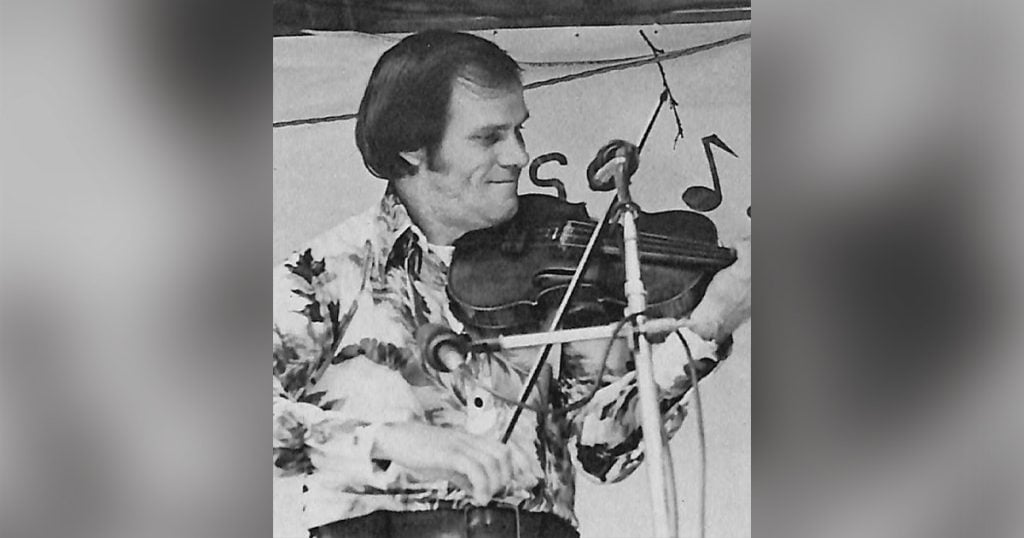
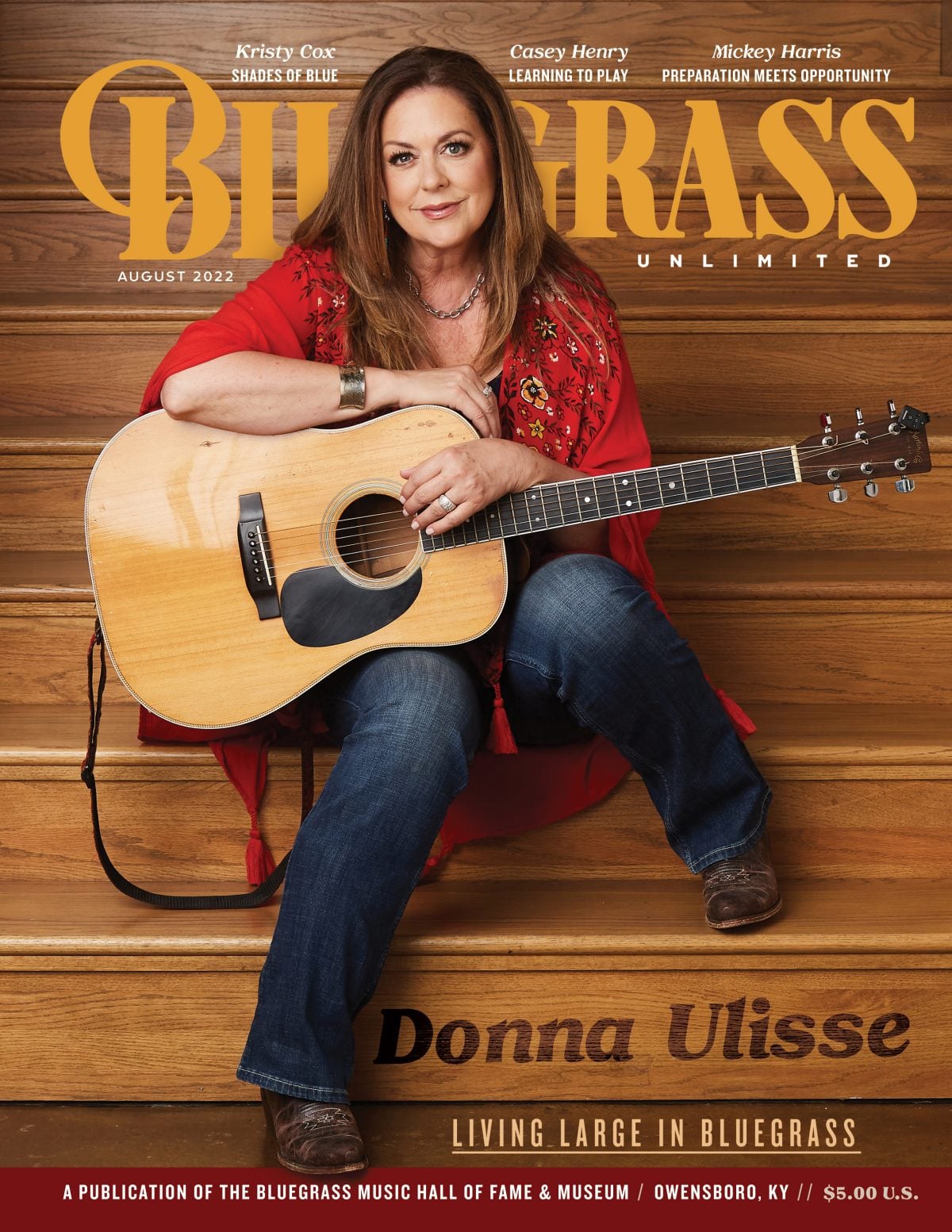
Joe was a great fiddle player..his work with Jim and Jesse..1974 to 1976 should always be displayed as his greatest with the Jesse mando style..just great music. Rj
Has always been one of my favorite Bluegrass fiddlers since I first heard his record in 1977!